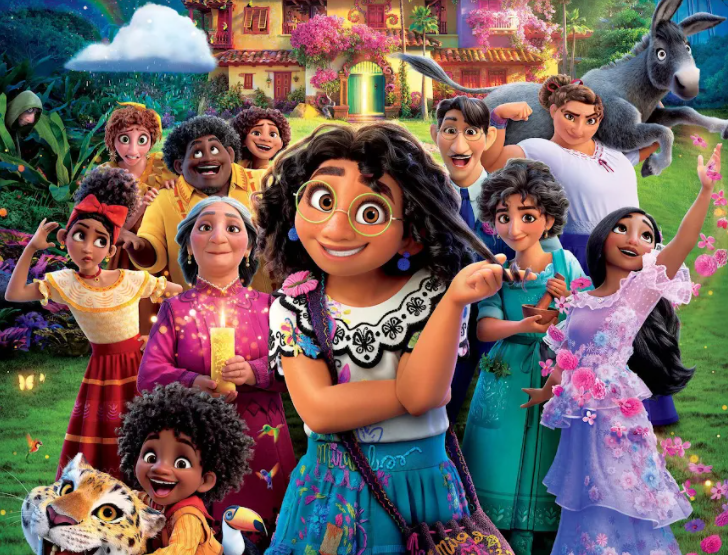Newly released Disney film, Encanto, has exploded internationally, attracting viewers with its vibrant visuals, catchy soundtrack, and heartwarming plot. For a second week, Encanto’s soundtrack topped the Billboard 200 Albums chart and has surpassed the Frozen hit, “Let It Go” on the Billboard Hot 100. Encanto gained rapid popularity on an unprecedented level that hasn’t been seen before with Disney’s older films, going viral on TikTok as creators dance to the movie’s rhythmic tunes and discuss character theories.
So first, what’s all the attention about? Encanto is an uplifting story about the Madrigal family, a unique cast of characters that each have a magical power–that is, all of them except the main character, Mirabel. While her super-strong sister Luisa can lift bridges and her cousin Camilo can shapeshift, Mirabel possesses no magical qualities. The family’s powers help sustain their town, their mission of peace and community upheld by the head of the family, Abuela. Mirabel’s lack of magic is a source of tension between her and Abuela, who is constantly concerned with maintaining the family magic and keeping the town prosperous. Nevertheless, when Mirabel notices cracks in the family’s magical source, she takes it upon herself to investigate the problem.
From there, Encanto goes on to explore the topic of family, touching on the effects of intergenerational trauma, finding comfort in your loved ones, and the fact that no family can be perfect. The Madrigals discover hope and meaning by breaking down and helping each other get back up again.
One can connect this to the larger issue of representation and the significance of the movie’s setting in Colombia. The film does a beautiful job of showcasing Colombian architecture, music, nature and much more. On a deeper note, it also touches on a Colombian experience that Western media all too frequently overlooks. José María Luna, writer for Polygon, captures this perfectly in her article on Encanto. Colombia tends to be represented as a corruption, drug, and murder capital. While this may objectively hold true, the subjective and personal experiences of the Colombian people are often not given the same attention. Luna comments, “There’s nothing more Colombian than the desire to find a home in an inherently broken country.” She goes on to say, “The happiness portrayed in Encanto isn’t just escapism, it’s defiance. It’s about challenging that notion that we Colombians have to be miserable forever.” Encanto is an ode to that journey of finding hope in a seemingly hopeless situation.
Riddhima Patllollu
Staff Writer
Graphic: Jiah Lee

